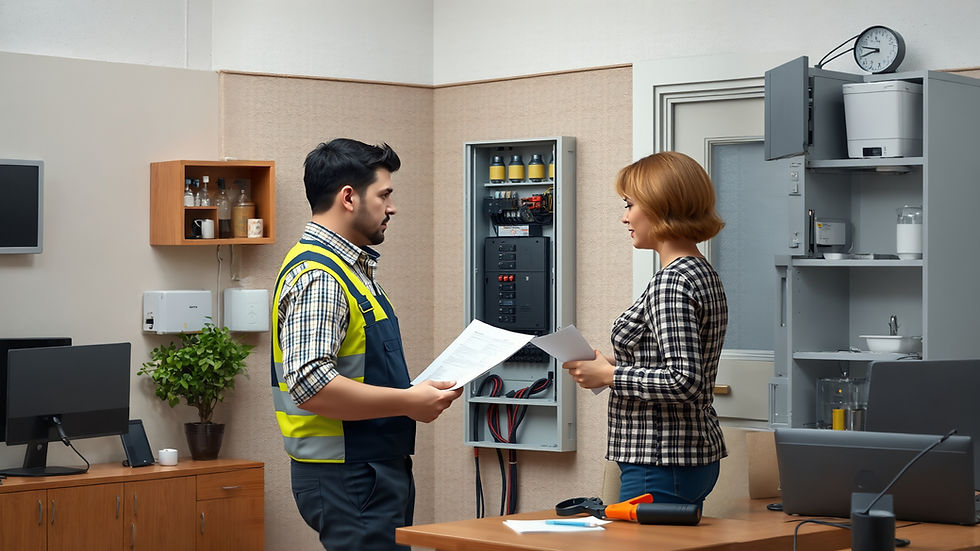7 Common Electrical Problems in Homes and How to Fix Them Safely
- John Mayers
- Jul 24
- 3 min read
Common Home Electrical Issues and Safe Solutions
Flickering lights? Tripping breakers? These are signs of typical household electrical problems. Most can be safely resolved with the help of a qualified electrician in Ampthill. From faulty wiring to overloaded sockets, knowing what to look out for can prevent major hazards. Let's explore seven frequent issues and how to tackle them — without compromising your safety.
Why Safe Electrical Repairs Matter
Electricity is no joke. A minor issue can lead to fires, appliance damage, or electric shock. If you're experiencing persistent electrical problems, it's always best to call a local professional for domestic electrical services in Ampthill. This guide is your starting point for recognising problems early and understanding your repair options.
1. Flickering or Dimming Lights
What It Means:
This usually points to loose connections or overloaded circuits.
Safe Fix:
First, check if the bulb is properly fitted or faulty.
If lights flicker when using large appliances, your circuit may be overloaded.
Call an electrician in Ampthill to inspect wiring or upgrade the circuit.
2. Frequent Tripping Circuit Breakers
What It Means:
Your system is detecting a fault and shutting down to prevent danger.
Safe Fix:
Identify which appliance triggers the trip.
Unplug it and test again.
If the issue persists, you may need rewiring and electrical service to address outdated or damaged circuits.
3. Dead Outlets
What It Means:
Could indicate wiring issues or a tripped GFCI (Residual Current Device in the UK).
Safe Fix:
Check if the circuit breaker has tripped.
Press the reset button if it's a protected outlet.
No change? You’ll need a professional inspection as wires may be damaged or connections loose.
4. Overloaded Power Boards or Extension Leads
What It Means:
You're using more power than the socket can handle, risking overheating and fire.
🔧 Safe Fix:
Spread out your appliances across different outlets.
Avoid daisy-chaining extension cords.
Consider installing additional sockets through domestic electrical services.
5. High Electricity Bills with No Clear Reason
What It Means:
Faulty wiring or outdated systems may be wasting energy.
🔧 Safe Fix:
Replace old appliances with energy-efficient models.
Have an electrician in Ampthill assess your home for energy leaks, outdated wiring or poor earthing.
They might recommend rewiring for improved efficiency.

6. Buzzing Sounds from Switches or Sockets
What It Means:
This is never normal and could mean loose wiring or an internal arc.
Safe Fix:
Turn off the power immediately at the consumer unit.
Don’t touch buzzing outlets.
Call a professional offering rewiring and electrical service to replace or repair faulty components.
7. Light Switches Not Working Properly
What It Means:
Could be a faulty switch, old wiring, or incorrect installation.
Safe Fix:
If you’ve recently had work done, the switch may be miswired.
Old toggle switches can wear out.
Have a professional replace them safely and test for proper operation.
Why Choose a Local Electrician in Ampthill?
Finding a trusted electrician in Ampthill ensures fast response, local accountability, and knowledge of UK electrical standards. Whether it’s emergency repairs or long-term upgrades, a qualified local expert gives peace of mind.
Local providers offering domestic electrical services understand Ampthill homes and typical layouts. From fuse box replacements to full rewiring and electrical service, they’re equipped for both small fixes and major projects.
Tips to Stay Safe Until the Electrician Arrives
Don’t attempt rewiring unless you're qualified.
Turn off the mains if you suspect burning or sparking.
Never ignore buzzing sockets, burnt smells, or shocks from appliances.
Keep children away from problem areas.
FAQs: Electrical Problems in Homes
Q1: Is it safe to fix flickering lights myself?
It depends. If it’s just a loose bulb — yes. But if it involves wiring or recurring flickering, call an expert.
Q2: How often should a house be rewired?
Most UK homes need rewiring every 25–30 years. If your home is older, book a rewiring and electrical service inspection.
Q3: Can I install extra sockets on my own?
Legally, not without proper certification. Use licensed domestic electrical services to ensure safety and compliance.
Q4: What should I do if I hear a buzzing socket?
Turn off the power at the consumer unit and call a qualified electrician immediately.
Final Thoughts: Don’t Take Risks with Electricity
Small electrical faults often hint at bigger dangers. While some problems seem minor, only a professional can diagnose the full issue. Hiring a certified electrical Contractor means the job gets done right — safely, legally, and with your home’s longevity in mind.
✅ Protect your home
✅ Avoid future costs
✅ Stay safe, always



Comments